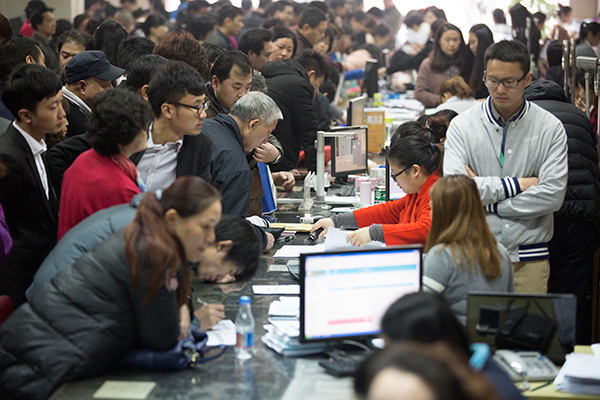 |
|
Homebuyers queue up for transaction procedures in Nanjing, capital of Jiangsu, over the weekend. [Photo provided to China Daily] |
I live in an eastern suburb of Beijing that until recently was known for being chaotic and noisy as it hosted a large rural market and was home to many migrant laborers.
But since last year, amid housing construction and the demolition of shabby homes, it has become one of the most expensive areas on the city fringe, with a new, top-line flat with three bedrooms selling for 10 million yuan ($1.54 million).
Resale prices have also surged in tandem with the latest housing boom in Beijing, Shanghai and Shenzhen that saw home prices rise 20 to 30 percent since the Chinese Lunar New Year. In my neighborhood, three-bedroom apartments now cost 6-8 million yuan, or about eight to 10 times more than what they cost when the estate was launched eight years ago.
My cell phone has been ringing now and then with calls from agents who urge me to sell my duplex apartment and upgrade into a luxury home. But I've seen too much to budge even with the regulators' warning to ease the pressure, like acting hard against easy home loans for low-down-payment mortgages.
Probably anyone familiar with the housing market would doubt if developers and agents who assist buyers with the loans, were the main culprit for the unexpected wave of property buying.
For some young buyers, it's common for their parents to dish out the down payment, assuming they will repay in the future. But many more would offer to pay in installments over several months during which they could sell their current houses and arrange for loans-such as loans from developers and agents-in case of a shortfall. The danger of a looming US-style subprime crisis might have been largely exaggerated.
Instead, a spate of property easing measures, easy credit, concerns about shortages of housing supply and recent stock routs have worked together to unleash some residents' pent-up demand for nicer and bigger homes in major cities.
For example, to encourage people to buy houses, interest rates have been lowered and transaction tax on bigger flats with a size of at least 140 square meters, has been cut from 3 percent to 1.5 percent, which means steep savings for buyers because such deals usually involve several millions of yuan.
The market's return back to life has also reinforced the popular belief that housing prices will only go up. Over the years, the government has tried to curb price rises by imposing a series of conditions on purchase. But each time, after a short, slight dip, prices have rebounded with a vengeance, leaving those wishing for big falls cursing their gullibility and slow moves.
After the stock turmoil last year, property proves again to be the best investment vehicle that the wealthy could park their funds in and middle-class urbanites build their nesting eggs with. While many homebuyers laugh their way to the bank, most stock investors have experienced anger and regret after their money evaporated in market meltdowns.
For second-steppers, bigger homes are gaining favor as their families have outgrown their first homes after their children grow up and their financial positions improve.
In Beijing, small homes with a size of less than 90 square meters used to account for the bulk of those sold since 2006, when the government imposed a homebuilding ratio in favor of low-income families.
The tide is turning as indicated by rapid price increases in big flats while prices of their small siblings stagnated. Developers in pursuit of new business opportunities are also inclined to build bigger homes that now account for 70 percent of the housing inventory in Beijing.
The red-hot housing market looks set to rage on. But should I sell high and buy higher? Probably not.
